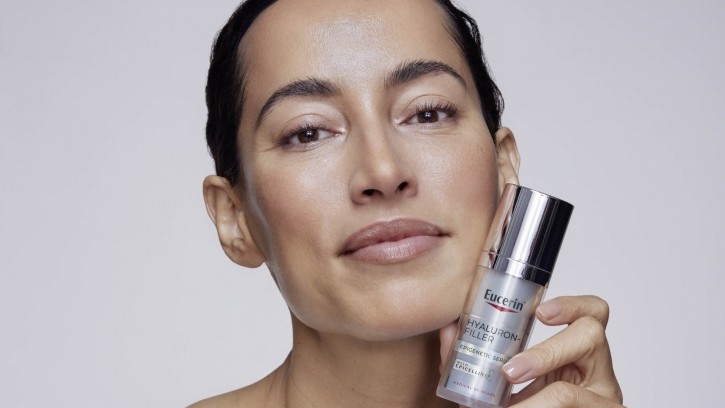(Image Beiersdorf) Eucerin’s latest facial skin care serum features a trailblazing new epigenetics ingredient and has been 15 years in the making…
Beiersdorf, the German parent company of brands such as Nivea and Eucerin has just officially launched its long-awaited epigenetics-based serum under the derma skin care brand, Eucerin.
Eucerin Hyaluron-Filler Epigenetic Serum is the first product launch with its new active ingredient Epicelline, which it claims: “reactivates youth genes to reverse signs of ageing.”
Beiersdorf’s CEO Vincent Warnery said it was “truly life-changing what we have already achieved with our pioneering epigenetic research” and claimed that the single product “fights ten signs of skin aging at once and makes people look up to five years younger.”
“We are turning back time,” he added.
Reactivating silenced youth genes
Skin ageing is a highly complex, multifactorial process that has long been attributed to genetics, but Beiersdorf said that epigenetic research has now “consistently disproved this.”
According to Beiersdorf, skin appearance is influenced by numerous external factors like diet, lifestyle, stress, or UV exposure that “create a unique epigenetic pattern on your skin code, which regulates the activity of certain genes.”
External influences and the ageing process can “silence skin-relevant genes and deactivate our youth genes,” according to Beiersdorf.
“All of this takes place with no changes in genetic information. Instead, small, chemical molecules are attached to the DNA. This process, known as DNA methylation, can be reversed,” said the company.
Beiersdorf said that its new discovery can “reactivate the silenced youth genes using the age clock technology.”
It’s based on epigenetic patterns and its algorithm determines the biological age of the skin, which can differ significantly from chronological age. This research allowed Beiersdorf scientists to identify Epicelline.
The new Eucerin serum formulation also features hyaluronic acid, glycine saponin, and enoxolone and works to improve skin firmness, reduce wrinkles, give a lifting effect, improve facial contours, and rejuvenate the skin.
“Beiersdorf recognised the potential of epigenetics early on and is now paving the way for major innovations in the efficacy of products supporting our consumers in healthy ageing,” explained the company’s corporate senior VP for R&D Dr Gitta Neufang.
“The skin-specific age clock helps us find novel skin care solutions that make people look younger than they really are. Leveraging our scientific expertise in the field of epigenetics, our goal is not only to improve single functionalities of aged skin cells, but to fundamentally rejuvenate skin cells,” said Dr Neufang.
850,000 ‘methylation sites’ were measured
In 2023, Beiersdorf invested €240m in research and development (R&D).
The company began developing the first skin-specific “age clock” in 2016 and received a patent for it in 2021.
Its scientists have analysed skin samples from more than 1,000 people and 850,000 so-called ‘methylation sites’ were measured for each person to learn, via analysis of the individual epigenetic pattern, which of these epigenetic markers are associated with skin ageing.
To date, the team has scrutinised around 50,000 substances and extracts to identify and qualify active ingredients for skin rejuvenation.

